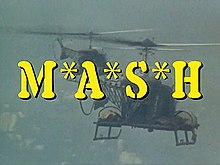Our website is made possible by displaying online advertisements to our visitors.
Please consider supporting us by disabling your ad blocker.
M*A*S*H (TV series)
| M*A*S*H | |
|---|---|
 | |
| Genre | |
| Based on | |
| Developed by | Larry Gelbart |
| Starring | |
| Theme music composer | Johnny Mandel (written for the film) |
| Opening theme | "Suicide Is Painless" (Instrumental) |
| Ending theme | "Suicide Is Painless" (Big Band Version) |
| Country of origin | United States |
| Original language | English |
| No. of seasons | 11 |
| No. of episodes | 256 (list of episodes) |
| Production | |
| Executive producers |
|
| Production locations | Los Angeles County, California (Century City, Malibu Creek State Park) |
| Camera setup | Multi-camera |
| Running time | 24–26 minutes; except "Goodbye, Farewell and Amen" (2 hours) |
| Production company | 20th Century Fox Television |
| Original release | |
| Network | CBS |
| Release | September 17, 1972 – February 28, 1983 |
| Related | |
| |
| Infobox instructions (only shown in preview) | |
M*A*S*H (an acronym for Mobile Army Surgical Hospital) is an American war comedy drama television series that aired on CBS from September 17, 1972, to February 28, 1983. It was developed by Larry Gelbart as the first original spin-off series adapted from the 1970 feature film M*A*S*H, which, in turn, was based on Richard Hooker's 1968 novel MASH: A Novel About Three Army Doctors. The series, produced by 20th Century Fox Television for CBS, follows a team of doctors and support staff stationed at the "4077th Mobile Army Surgical Hospital" in Uijeongbu, South Korea, during the Korean War (1950–53).
The ensemble cast originally featured Alan Alda and Wayne Rogers as surgeons Benjamin "Hawkeye" Pierce and "Trapper" John McIntyre, respectively, as the protagonists of the show; joined by Larry Linville as surgeon Frank Burns, Loretta Swit as head nurse Margaret "Hot Lips" Houlihan, McLean Stevenson as company commander Henry Blake, Gary Burghoff as company clerk Walter "Radar" O'Reilly, Jamie Farr as orderly Maxwell Klinger, and William Christopher as the chaplain, Father John Mulcahy. Over the run of the show, several members of the main cast were replaced: Wayne Rogers was replaced by Mike Farrell as B. J. Hunnicutt, McLean Stevenson was replaced by Harry Morgan as Sherman Potter, Larry Linville was replaced by David Ogden Stiers as Charles Emerson Winchester III, and, when Gary Burghoff left the show, the Maxwell Klinger character moved into the company clerk role. Longtime supporting cast members included Kellye Nakahara, Jeff Maxwell, Johnny Haymer, Allan Arbus, Edward Winter and G. W. Bailey.
The series varied in style and tone – including broad comedy and tragic drama – which can be attributed to fluctuating writing staff over the life of the show and the variety of sources contributing to the stories, such as actor Alan Alda and surgeons who served in the Korean War.[1] The show's title sequence features an instrumental version of "Suicide Is Painless", the original film's theme song.[2]
The show was created after an attempt to film the original book's sequel, M*A*S*H Goes to Maine, failed. The television series is the best-known of the M*A*S*H works and one of the highest-rated shows in U.S. television history and is regarded by many as one of the greatest television shows of all time.[3][4][5][6][7][8] Its final episode, "Goodbye, Farewell and Amen", was the most-watched television broadcast in the US from 1983–2010,[9] and it remains both the most-watched finale of any television series and the most-watched episode of a scripted series.[10]
- ^ Kalter, Suzy (1984). The Complete Book of M*A*S*H. New York: Abradale Press, Harry M. Abrahams, Inc. ISBN 0-8109-8083-5.
- ^ M*A*S*H* - movie theme song - opening, November 24, 2008, archived from the original on December 11, 2021, retrieved April 7, 2021
- ^ "TV Guide Names Top 50 Shows". CBS News. April 26, 2002. Retrieved March 5, 2016.
- ^ "Mensa Picks 10 Smartest TV Shows of All Time". Fox News. February 19, 2008. Archived from the original on February 23, 2021.
- ^ "101 Best Written TV Series List". Archived from the original on June 7, 2013. Retrieved March 5, 2016.
- ^ Fretts, Bruce; Roush, Matt. "The Greatest Shows on Earth". TV Guide. Vol. 61, no. 3194–3195. pp. 16–19.
- ^ "100 Greatest TV Shows of All Time". Rolling Stone. September 21, 2016. Retrieved January 21, 2018.
- ^ "The 100 Greatest TV Shows of All Time". Variety. December 20, 2023.
- ^ Gardner, Tim (February 8, 2010). "Saints' win over Colts in Super Bowl XLIV is most-watched television program ever". USA Today. Retrieved May 28, 2021.
- ^ Porter, Rick (February 5, 2018). "TV Ratings Sunday: Super Bowl LII smallest since 2009, still massive; 'This Is Us' scores big [Updated]". TV by the Numbers. Archived from the original on February 5, 2018. Retrieved May 28, 2021.
Previous Page Next Page


